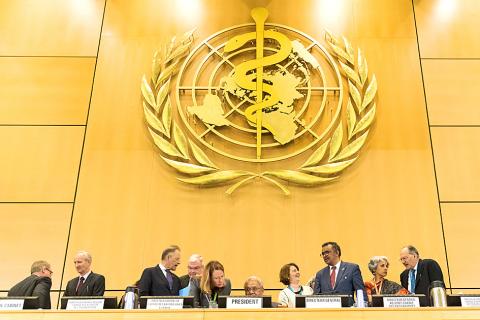The US, Japan and three other countries have added their support for Taiwan’s inclusion in the WHO at an ongoing meeting of the world body’s executive board in Geneva, Switzerland.
US Department of Health and Human Services Office of Global Affairs Deputy Director Colin McIff on Monday urged the WHO during the meeting to allow Taiwan to participate in relevant technical activities.
“As the WHO leads the global response to health emergency, including the ongoing outbreak of Ebola in the Democratic Republic of [the] Congo, it is critical that the organization be able to engage the technical expertise and financial resources from all interested parties,” McIff said.

Photo: AP
The US was pleased when Taiwan offered to contribute US$1 million to combat Ebola last year, but was disappointed that the WHO has not found a way to accept the contribution, McIff said.
The government last month suspended the donation it pledged in May last year, after the WHO convention secretariat was unable to credit Taiwan in a way that it would find acceptable due to “political factors.”
The “participation of Taiwan in relevant technical work of WHO is beneficial to all,” McIff said.
Supporting Taiwan in an indirect manner, Japanese Ministry of Health, Labor and Welfare Senior Coordinator for Global Health Hiroyuki Hori called on the WHO to refrain from leaving anyone behind.
“As the world has become more globalized and the threat of infectious diseases that may spread beyond borders has become increasing, we assume that we should not make a geographical blank by leaving a specific region behind,” Hori told the meeting.
Meanwhile, three of Taiwan’s diplomatic allies also advocated for Taiwan’s cause at the meeting, despite the nation’s decision not to push for a formal proposal advocating for its inclusion in the WHO at this year’s meeting.
Solomon Islands Ambassador to the UN Barrett Salato told members of the executive board that millions of people in Taiwan could be vulnerable in the event of an outbreak, which could pose threats to people from other nations.
“Taiwan is a willing partner... We urge the WHO to invite Taiwan to participate meaningfully in all WHO meetings and programs in order to share its technical expertise and experience in global health emergency and humanitarian efforts,” Salato said.
Guatemala’s representative thanked Taiwan for expanding its cooperation with his country on healthcare and medicine accessibility for pregnant women, while Nicaragua’s representative said that the absence of representation for Taiwan’s 23 million people in the WHO could cause a vulnerability in the global health network.
Their support followed similar gestures by Taiwan’s diplomatic allies Eswatini, Haiti and Paraguay at an executive board meeting on Saturday.
Taiwan was able to attend the annual World Health Assembly as an observer from 2009 to 2016, when cross-strait relations were more amicable, but it has not received an invitation for two consecutive years.

INVESTIGATION: The case is the latest instance of a DPP figure being implicated in an espionage network accused of allegedly leaking information to Chinese intelligence Democratic Progressive Party (DPP) member Ho Jen-chieh (何仁傑) was detained and held incommunicado yesterday on suspicion of spying for China during his tenure as assistant to then-minister of foreign affairs Joseph Wu (吳釗燮). The Taipei District Prosecutors’ Office said Ho was implicated during its investigation into alleged spying activities by former Presidential Office consultant Wu Shang-yu (吳尚雨). Prosecutors said there is reason to believe Ho breached the National Security Act (國家安全法) by leaking classified Ministry of Foreign Affairs information to Chinese intelligence. Following interrogation, prosecutors petitioned the Taipei District Court to detain Ho, citing concerns over potential collusion or tampering of evidence. The

Seventy percent of middle and elementary schools now conduct English classes entirely in English, the Ministry of Education said, as it encourages schools nationwide to adopt this practice Minister of Education (MOE) Cheng Ying-yao (鄭英耀) is scheduled to present a report on the government’s bilingual education policy to the Legislative Yuan’s Education and Culture Committee today. The report would outline strategies aimed at expanding access to education, reducing regional disparities and improving talent cultivation. Implementation of bilingual education policies has varied across local governments, occasionally drawing public criticism. For example, some schools have required teachers of non-English subjects to pass English proficiency

NEGOTIATIONS: The US response to the countermeasures and plans Taiwan presented has been positive, including boosting procurement and investment, the president said Taiwan is included in the first group for trade negotiations with the US, President William Lai (賴清德) said yesterday, as he seeks to shield Taiwanese exporters from a 32 percent tariff. In Washington, US Trade Representative Jamieson Greer said in an interview on Fox News on Thursday that he would speak to his Taiwanese and Israeli counterparts yesterday about tariffs after holding a long discussion with the Vietnamese earlier. US President Donald Trump on Wednesday postponed punishing levies on multiple trade partners, including Taiwan, for three months after trillions of US dollars were wiped off global markets. He has maintained a 10 percent

TRADE: The premier pledged safeguards on ‘Made in Taiwan’ labeling, anti-dumping measures and stricter export controls to strengthen its position in trade talks Products labeled “made in Taiwan” must be genuinely made in Taiwan, Premier Cho Jung-tai (卓榮泰) said yesterday, vowing to enforce strict safeguards against “origin laundering” and initiate anti-dumping investigations to prevent China dumping its products in Taiwan. Cho made the remarks in a discussion session with representatives from industries in Kaohsiung. In response to the US government’s recent announcement of “reciprocal” tariffs on its trading partners, President William Lai (賴清德) and Cho last week began a series of consultations with industry leaders nationwide to gather feedback and address concerns. Taiwanese and US officials held a videoconference on Friday evening to discuss the